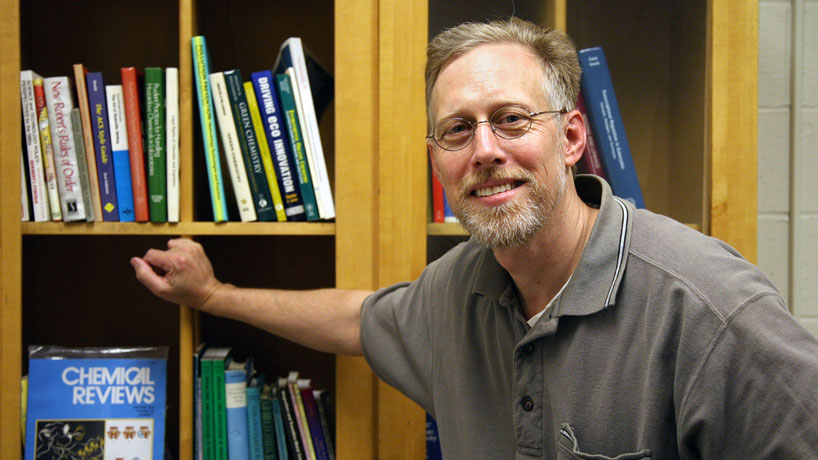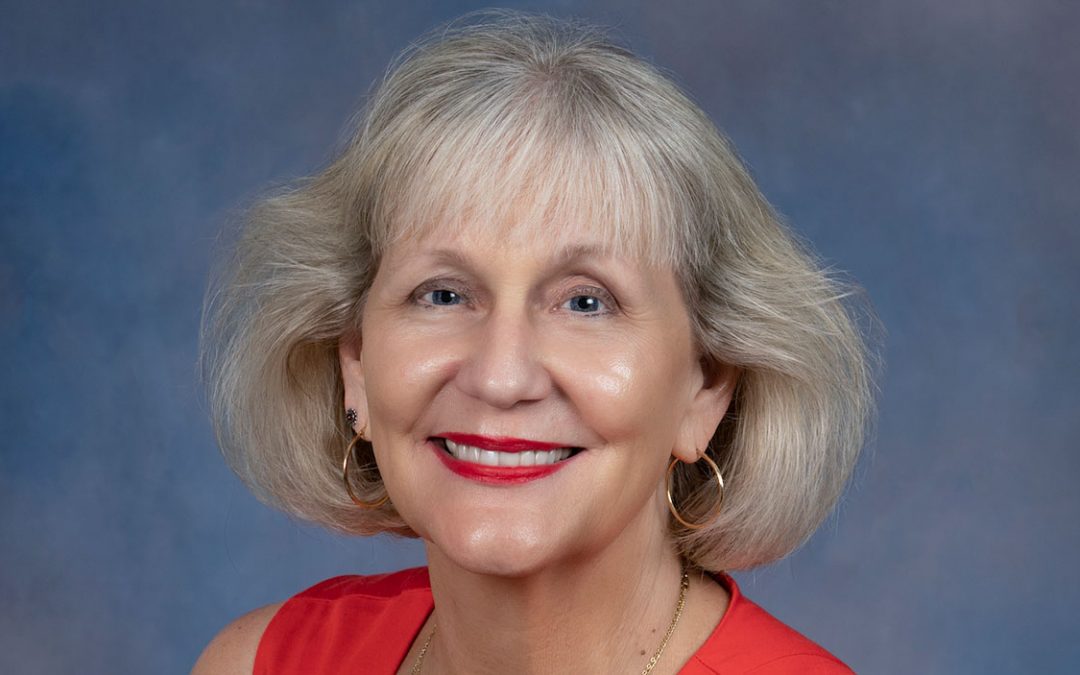
James Bashkin, professor of chemistry and biochemistry at UMSL, joined Gill Eapen on his podcast Scientific Sense, which delves into developments in science and technology. During the 45-minute episode, the two discussed Bashkin’s projects and research, including an affordable PPE sterilizer and antiviral treatments for HPV. (Photo by August Jennewein)
Gill Eapen explores emerging ideas in science, public policy, economics and technology with leading experts on his podcast Scientific Sense. So, it’s no surprise James Bashkin joined him for a wide-ranging discussion released July 11.
Bashkin is a professor of chemistry and biochemistry at the University of Missouri–St. Louis and has previously worked as an NIH postdoctoral fellow at Harvard and with Monsanto Corporate Research.
His research at UMSL has dealt primarily with the intersection of chemistry and biology in areas such as chemical genomics and the design of antiviral and anticancer agents.
During the 45-minute episode, Bashkin and Eapen covered a variety of topics including advances in personal protective equipment sterilization, the development of antiviral drugs and “green chemistry.”
Eapen noted supplies of N95 respirator masks, which are capable of filtering 95 percent of airborne particles, became limited quickly after the onset of the COVID-19 pandemic. The shortages have necessitated the sterilization and reuse of PPE in hospitals.
However, Bashkin said most of the sterilization equipment on the market is prohibitively expensive and its use is often limited to large hospitals. That’s why he teamed with KWJ Engineering and Speck Sensor to work on a portable, reagent-free sterilizer for N95 masks and other PPE.
The team is still waiting for funding to complete the project, but the initial prototype is very promising.
“KWJ and Speck Sensor have a great deal of expertise in electrochemical detection, and that turns out to be very useful for making a 12-volt-based decontamination chamber that can be anywhere from 5 gallons on up in size,” Bashkin said. “The lowest size would be around $300 and would be able to sterilize on the order of 10 or more masks at one time.”
He characterized it as a useful tool that any hospital, police station or fire station could have on hand to keep essential workers safe.
“We’re hoping this would be a way to bring sterilization of equipment to a much broader audience,” he added.
The conversation then turned to Bashkin’s research on antiviral compounds to help treat HPV infections that run the risk of turning into many types of cancer, though cervical cancer is most often associated with HPV.
These drugs are a valuable tool for fighting cancer as vaccinations for HPV lag worldwide – even in the United States. As people go unvaccinated and are exposed to the virus, the risk of cancer increases.
“It’s been shown in the clinic that the progress toward cervical cancer is linked to the amount of HPV-16 in someone’s system – the viral titer,” Bashkin said. “If we can drop the viral titer down to very low levels with an antiviral drug, then we have the chance of greatly limiting the progress to cancer for these pre-cancerous patients.”
Bashkin hopes to bring the treatments to clinics soon, but more funding is needed to scale the last of the pre-clinical studies and to file an investigational new drug application.
Eapen then touched on new developments with the drug chloroquine, which has historically been used to treat malaria. Bashkin is working with a doctor and pharmacist on a new chloroquine topical gel for HPV-derived diseases such as Bowen’s disease, which is a pre-cancerous and then cancerous skin condition.
“One of the effects it has is to reestablish concentrations of a tumor-suppressor protein that it turns out HPV gets rid of,” Bashkin said. “This interferes with the life cycle of HPV.”
The chat ended with an overview of green chemistry – a concept that aims to reduce or eliminate the generation of hazardous substances during the design of chemical products and processes. Bashkin elaborated, saying ideally chemists would consider atom economy, energy economy and the reduction of waste streams any time a project is taken online.
But those principles aren’t always put into practice due to commercial production schedules in the commodity chemical and pharmaceutical industries. Greener processes can create cost savings in the long run by eliminating waste, but Bashkin and Eapen recognized it can seem counterintuitive at first glance.
Though Bashkin saw it firsthand working on a project at Monsanto.
“Some people might say, ‘Worrying about the environment always costs industry more money,’ but that was a case where it actually made industry a lot of money,” he said with a laugh.
Listen to the full episode here.














